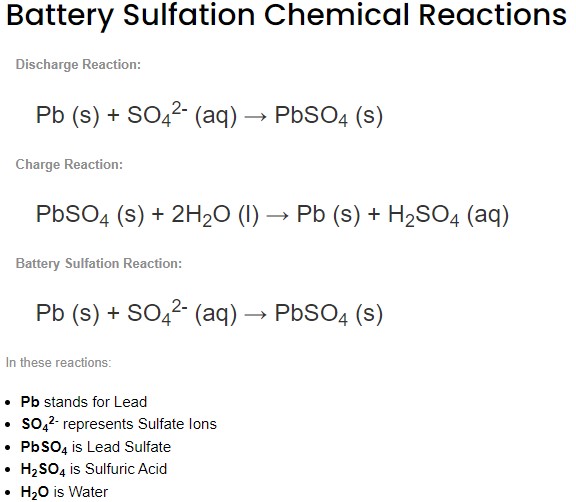What is Battery Sulfation?
Battery sulfation is a condition that affects lead-acid batteries, including those used in cars. What is battery sulfation and how does it occur? It occurs when lead sulfate crystals build up on the battery’s lead plates, hindering the battery’s ability to hold a charge and perform effectively.
How does sulfation occur?
In a lead-acid battery, lead sulfate (PbSO4) is a normal byproduct of the chemical reactions that occur during the discharge process. However, when a battery is not fully charged or remains in a discharged state for extended periods, the lead sulfate can crystallize and form a layer on the battery plates.

Impact on Battery Performance:
Reduced Capacity
The lead sulfate crystals obstruct the battery’s plates, limiting the battery’s ability to accept and deliver electrical current. This results in reduced capacity and shorter battery life.
Difficulty in Charging
The crystallized sulfate makes it harder for the battery to absorb a charge, leading to longer charging times and insufficient power output.
Increased Internal Resistance:
Sulfation increases the internal resistance of the battery, which can affect overall performance and efficiency.
What causes battery sulfation?
Prolonged Discharge:
If a battery remains in a partially discharged state for a long time, sulfation is more likely to occur.
Overcharging or Undercharging:
Improper charging practices can lead to sulfation. Overcharging can cause excessive heat, while undercharging can lead to insufficient charging and sulfate buildup.
Infrequent Use:
Batteries that are not used regularly can suffer from sulfation due to insufficient charging cycles.
What are signs of Sulfation?
Hard Starting:
Difficulty in starting the vehicle or sluggish engine performance can be a sign of sulfation.
Reduced Battery Life:
A battery that has a significantly shorter lifespan than expected may be suffering from sulfation.
Charging Issues
If the battery struggles to reach a full charge or has a reduced charge-holding capacity, sulfation might be the cause.
Safety Precautions
Safety is paramount when dealing with car batteries. Prioritize your well-being by donning protective goggles and gloves to shield yourself from harmful chemicals. Moreover, always disconnect the negative terminal first to minimize the risk of electrical shock during the cleaning process.




